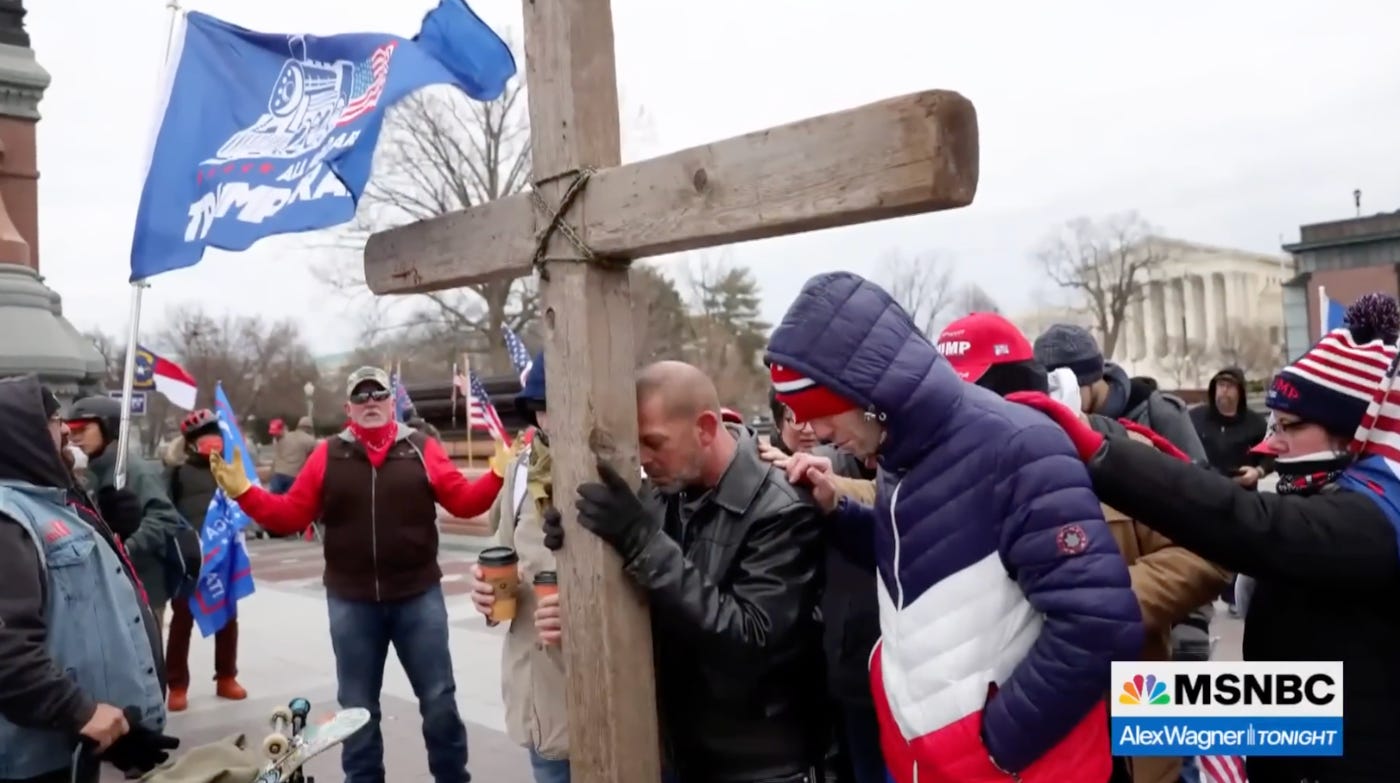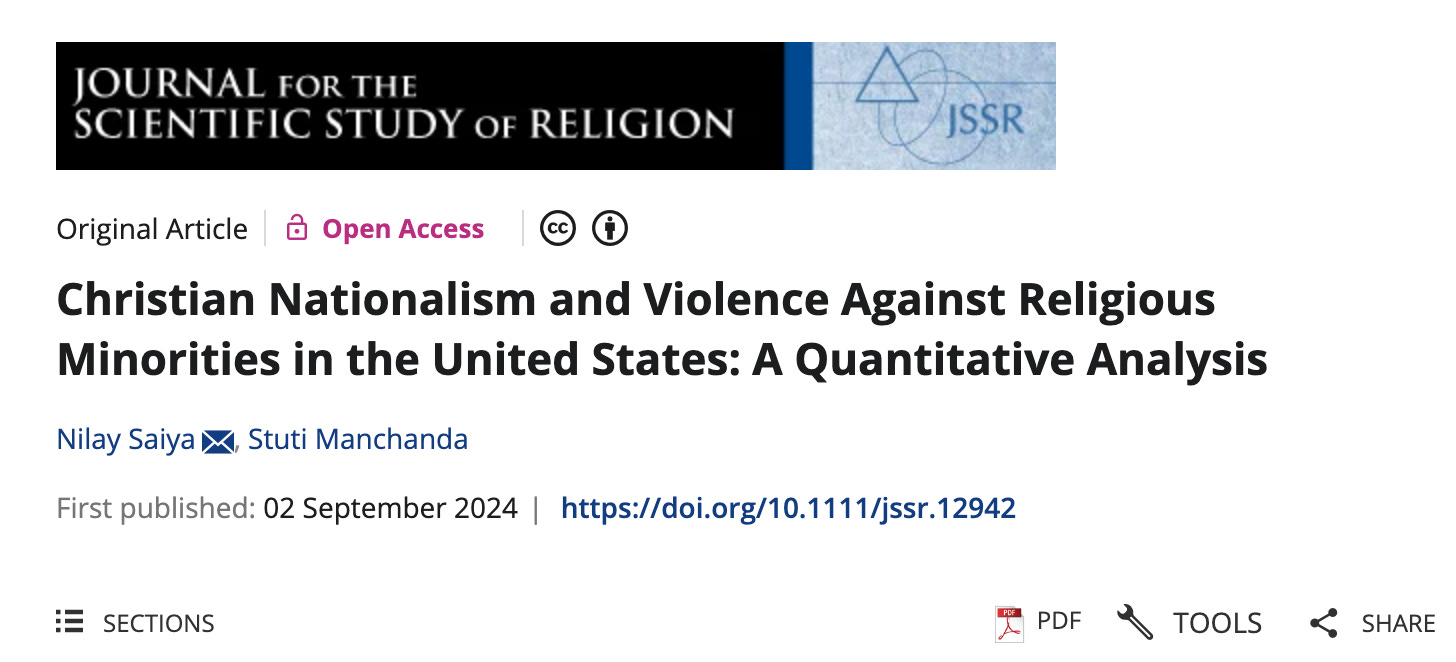Researchers say Christian Nationalism fuels violence against non-Christians
A new study links Christian Nationalist ideology and physical attacks on religious minorities
This newsletter is free, but it’s only able to sustain itself due to the support I receive from a small percentage of regular readers. Would you please consider becoming one of those supporters? You can use the button below to subscribe to Substack or use my usual Patreon page!
We know Christian Nationalism—the mistaken idea that America is rooted in conservative-style Christianity and that the government must make sure it stays that way—is dangerous. It encourages Republicans to support policies, like abortion bans and forced religion in schools, that are bad for the country but backed by the most fervent segments of their base. The belief that we should be a “Christian nation,” however one defines it, is also accepted by roughly 45% of Americans, including 81% of white evangelicals.
But is the concept also physically dangerous?
Yes, according to a new paper published in the Journal for the Scientific Study of Religion.
You might already assume that, given how Christian Nationalists are more likely to oppose gun safety measures. They also overwhelmingly support Donald Trump and, therefore, his attempted insurrection in 2021 (where Christian flags were flown). There is also quite a bit of overlap between Christian Nationalists and right-wing militias and conspiracy-fueled groups like Q-Anon and the Proud Boys. It’s not ambiguous in surveys, either. A 2023 PRRI survey found that 40% of adherents of Christian Nationalism felt political violence was acceptable to save the country, a number nearly seven times as large as those who rejected the ideology.

But is there a way to connect the dots between support of Christian Nationalism and direct violence?
Researchers Nilay Saiya and Stuti Manchanda of Nanyang Technological University attempted to do that by examining the link between “politicians’ embrace of Christian nationalism” and anti-minority violence.
When politicians affirm the idea that a country belongs to a particular religious group, their beneficiaries may arrive at the reasonable conclusion that the state implicitly approves of discrimination, harassment, and even violence against nonprivileged faiths. Thus, the language politicians use can fuel tribalism, reduce inhibitions, and reduce the perceived costs of engaging in majoritarian violence, even if this is not the intention of the said speech.
To begin with, they noted that the nation is becoming increasingly secular, and that feeds into a persecution complex that Christian Nationalists feel obligated to counter. “Given present trends, Christians will no longer enjoy unquestioned social and political supremacy in the future,” they write. Everyone from neo-Nazi Nick Fuentes to evangelical preacher James Dobson have warned their followers that the nation’s changing demographics “will take us down if we don’t deal with it.”
That has already inspired violence in very real ways. The researchers point to how the mass shooter in El Paso, Texas in 2019 echoed Trump’s anti-immigrant rhetoric, and how his anti-Muslim messaging led to a (failed) bomb plot against a Kansas mosque in 2016. The researchers also note that Hindu extremists have inflicted similar kinds of violence against minorities in India, which is ruled by a BJP party that espouses pro-Hindu beliefs.
The paper hypothesizes that states run by politicians who adhere to Christian Nationalism will see more violence against religious minorities than states run by decent people. To investigate this, they took data from the Global Terrorism Database, specifically attacks by self-professed Christians against non-Christians, in every state between 1990 and 2018. They connected it to Christian Nationalist rhetoric uttered by the senators of those states (or candidates who later won those seats).
For example, in 2015, Sen. Ted Cruz of Texas told a crowd that “Any president who doesn’t begin every day on his knees isn’t fit to be commander-in-chief of this nation.” Was there more Christian-on-non-Christian violence in that state afterwards?
The researchers say there was:
The model ratios indicate that states where senators articulated support for Christian nationalism recorded between 1.4 and 1.5 times the number of Christian nationalist attacks per one-unit increase in the theoretically central independent variable.
The researchers spent quite a bit of time explaining how they accounted for other variables that might skew their results. I won’t go into their entire methodology here, but even after accounting for other possibilities, they conclude:
In summary, all of the results, including the robustness checks, provide ample support for the hypothesis that the public expression of Christian nationalist sentiments on the part of American senators is positively and robustly associated with greater attacks by Christians against non-Christians. In no cases was the Christian nationalism variable found to be statistically insignificant. In every case, it is signed in the expected positive direction, indicating support for our theory. Importantly, that our measure of Christian nationalism emerges as statistically significant and positive across models, despite the inclusion of numerous control variables, indicates that it is not simply capturing political partisanship.
Obviously, more detailed data could provide more support for this hypothesis. So could surveys that delve into how Christian Nationalist beliefs directly influence people in various states. So could more information about the motives of violent attackers.
Dr. Samuel Perry, co-author of The Flag and the Cross: White Christian Nationalism and the Threat to American Democracy (affiliate link) and one of the foremost experts on the subject, told me that this study reinforces his own research (though its obviously not definitive):
It doesn't quite demonstrate a causal connection, because that's a very high bar to clear. But it nonetheless establishes a robust association between Christian nationalist rhetoric among political elites and instances of actual violence perpetrated by self-described Christians against religious minorities in the states of those politicians. We need more data for sure. But this connection certainly makes sense intuitively based on what we've seen in survey data for years, and the authors go about the task of eliminating competing explanations for the association.
For now, there’s at least strong evidence that Christian Nationalist rhetoric isn’t just bad for democracy; it can exacerbate violence against religious minorities. Senators who represent entire states ought to be unifying forces, no matter their political views. Yet many GOP senators specifically have sought to turn Christians against non-Christians in the name of patriotism. They deserve to be called out on it, and voters should reject their faith-based divisiveness.


"But is there a way to connect the dots between support of Christian Nationalism and direct violence?"
Yep, it's called European history.
Christians, acting in the name of Christianity, have spilled a river of blood. There isn't a shred of evidence to support the claim Christianity makes people better. Some of the most mean-spirited, judgmental and intolerant people I have ever known never missed church. Prominent figures in the religious right are some of the most compelling arguments for why religion should never have a place in our secular government. The religious right is fighting a rear-guard action in an effort to accomplish through government and the courts what they have failed to achieve from their pulpits. The idea any religion could be imposed on a country as large and diverse as the United States, with a happy ending, is as dangerous as thinking gets.